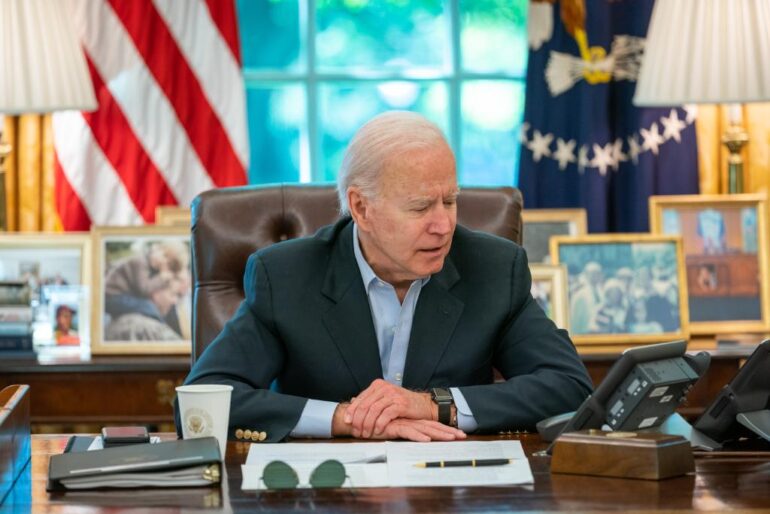According to a Wednesday morning report in Maariv, extensive meetings have been held between representatives of the Likud, Yesh Atid and National Unity factions over the past few day.
The negotiations have reportedly revolved around the possibility of a broad governing coalition comprised of all three political factions.
Prime Minister-designate Binyamin Netanyahu (Likud) reportedly spoke to lawmaker Betzalel Smotrich (Religious Zionism) for the first time in six days Tuesday night, following reports of an unbridgeable gap in forming Israel’s next government.
Channel 12 News reported that no progress was made in the meeting, since Netanyahu is not willing to hand Smotrich the defense ministry.
Netanyahu reportedly tried to explain to Smotrich the need to act cautiously on diplomatic and security matter due to pressure from the United States.
According to a Ynet report on Tuesday, the White House had informed Netanyahu that he is expected to appoint a defense minister that meets with US approval.
Speaking with Radio 103FM Wednesday morning, journalist Barak Ravid – who covers foreign affairs for Walla! and Axios – disclosed that US President Joe Biden’s administration has sent clear messages to Netanyahu that Washington will not support the appointment of Smotrich to the position.
“I tend to think that Smotrich will not be defense minister,” disclosed Ravid.
“Ten days ago, a senior American official told me that the identity of the next defense minister will have a huge impact on US-Israel relations.”
Ravid added that the US official had explicitly said his comments were intended to pressure Netanyahu to not hand Smotrich the ministry.
“He said: ‘We expect Netanyahu to read this after you publish it.’ I think Netanyahu’s office got the message.”
The Biden administration has meanwhile claimed that they are not seeking to interfere in Israel’s internal political matters but are simply concerned that a nationalist ideologue like Smotrich would complicate security cooperation between Washington and Jerusalem.
But interfering is exactly what the Americans are doing, and it’s not the first time. It has been consistent US foreign policy for decades to force Israel to relinquish the territories won in the 1967 Six Day War. To that end, Washington has interfered in Israel’s political system countless times to ensure a leadership in Jerusalem amiable to partitioning the country into two separate states.
In 1992, US President George H.W. Bush and his Secretary of State James Barker III conspired with Shimon Peres to successfully unseat Prime Minister Yitzḥak Shamir, who had outright refused American demands that Israel stop the construction of Jewish communities in the West Bank and Gaza.
In 1999, Bill Clinton dispatched a team of political operatives to successfully remove Netanyahu from office. Barack Obama failed in his V-15 attempt to do the same in 2015 and Donald Trump prevented Netanyahu from forming a government in recent years by using Avigdor Lieberman to block a nationalist coalition and repeatedly force new elections.
It therefore make sense that the heightened rhetoric from lawmakers in regards to Israel applying full sovereignty to the West Bank would alarm Washington enough to apply overt pressure to prevent a figure like Smotrich from assuming a role that would place him in direct control of Israel’s administration of the territories.
Netanyahu has become very good in recent years at outmaneuvering the Americans when it comes to Israel’s presence in the West Bank. Rather than confront US leaders directly with Jewish claims to the territories as he attempted to do with Clinton in the 1990s, Bibi has learned to act as if he’s cooperating with Washington’s two-state agenda while quietly doing everything in his power to thwart American plans. It’s an ugly and dangerous game but it’s proven more effective for Netanyahu than trying to outright resist as former Prime Minister Shamir had done.
Netanyahu understands the need to pick his battles with Washington and he likely tried to explain his strategy to Smotrich on Tuesday. But it’s possible that Smotrich didn’t take these arguments seriously because Netanyahu has a reputation for political deception and Israel’s national camp generally doesn’t appreciate the extent of US imperial control over Jerusalem.
The late journalist Eitan Haber, who served as Prime Minister Yitzḥak Rabin’s bureau chief and speechwriter, once explained in a lengthy 2013 interview with the Times of Israel how Israeli leaders tend to not understand the position of dependency Washington has successfully forced Israel into until they become prime minister.
“Many people, very many people, ask me what happens to political leaders when they enter the Prime Minister’s Office. Is there something in the ventilation system? Is there a special odor that causes dizziness? And I say, no. The people who make it to the second floor of 3 Kaplan street in Jerusalem — only there, only there and not a moment before — is it understood to what extent the State of Israel is dependent on America. For absolutely everything — in the realms of diplomacy, security, even economically — we are dependent on America.”
“Slowly your tone changes, because you understand that without the spare parts [from the US], your entire air force is grounded. And when you have no air force you have no defenses. You can barely do anything without America. Her diplomatic support, defensive support, economic support. We are in America’s little pocket.”
Haber’s sober explanation of the US-Israel relationship and for why nationalist leaders all too often appear to sell out on their values when they reach higher office should alert us to the core issue Israel’s national camp should be focused on. No matter how well nationalist political parties perform in elections, they will not be able to shape policy until the State of Israel gains its freedom from the United States.
The fact that Israel’s national camp consistently fails to grasp the role US influence plays in determining crucial Israeli policies reveals a deep weakness that has prevented us from resisting efforts to divide our land. Betzalel Smotrich – who hails from a sector of society deeply rooted in Israel’s Torah, homeland and national story – clearly lacks an understanding of the world beyond Israel’s borders and therefore probably has trouble knowing when he should or shouldn’t trust Netanyahu. This is something he’ll need to correct about himself if he truly hopes to lead the national camp and bring Israel towards the vision shared by most of the sector he represents.
Rather than demand the defense ministry, Smotrich should ask Netanyahu for the foreign ministry.
As minister of foreign affairs, Smotrich would do a service to both his nation and humanity by more honestly representing to the world what the State of Israel is slowly transforming into. And engaging with the international community could help Smotrich learn to better understand the outside world – something that might be dangerous for political figures less deeply rooted in our people’s identity but necessary for someone like Smotrich to transcend beyond his narrow provincial tribalism so that he might ultimately realize his higher aspirations for the Jewish people.





